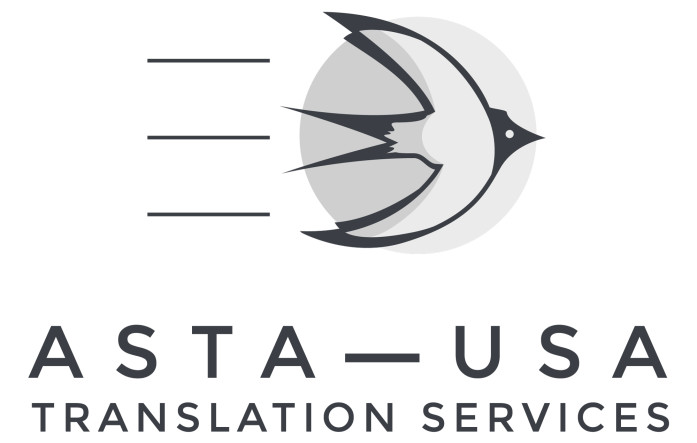from ASTA-USA Translation Services, Inc.
ASTA-USA Translation Services, Inc. Warns Businesses About Relying on AI Tools for Professional Translation Work
AI translation software misinterprets context almost half the time when compared to professional human translated and verified document services, resulting in potential business disasters with increased risk of cultural faux pas or nonsensical translations.
DALLAS, TX / ACCESSWIRE / May 30, 2024 / AI bots and translation tools have risen in popularity since the introduction of ChatGPT, and while they may be sufficient for traveling abroad or entertainment purposes, they are inaccurate and incorrect nearly half the time. ASTA-USA Translation Services, Inc., a leader in professional language translation services, advises businesses not to lean blindly on these services for professional purposes, as they cannot accurately capture specialized industry jargon, local nuances, or cultural context.

Companies in specialized industries, like education, legal or medical fields, are particularly susceptible to AI translation woes like cultural faux pas, nonsensical translations, or other mistakes that damage business branding and lead to costly or otherwise disastrous results. Mr. Alain J. Roy, founder and CEO of ASTA-USA Translation Services, Inc.,â¯cautioned that these tools are nearly 50% likely to produce inaccurate or misinterpreted translations and impact aâ¯business'sâ¯reputation.â¯"Because those utilizing these AI translation tools do not personally speak the target language, it is nearly impossible for them to detect these errors on their own and reliance on AI or unskilled translators can be disastrous for a business," said Mr. Roy.
For example, AI translations have led to significant issues for companies. A flagship airline carrier faced legal consequences when one of its chatbots disseminated misinformation about bereavement discounts. In another instance, a company had to recall 4.6 million cans of infant formula in 2001 due to inaccuracies and potentially harmful Spanish language instructions on the packaging. Additionally, there have been tragic outcomes in the UK, with over 80 infants suffering severe consequences or losing their lives because of reliance on AI translation tools.
This small sample highlights the devastating consequences of relying on technology that is still in its infancy; however, hundreds of thousands of these mistakes occur each year. Some of the most common problems that ASTA-USA Translation Services, Inc. has detected in examining AI-translated content include:
Style and Tone Alterations: When popular AI tools are utilized to produce translations, the tone is often exaggerated and loses the style carefully constructed within the source language.
Lack of Cultural Awareness: Language and culture go hand in hand and AI software is not able to understand pop culture references, local idioms, or the values, thoughts, and beliefs of a culture. This can lead to offensive or nonsensical translations that simply do not resonate with the intended audiences.
Failure to Consider Formality: Addressing an audience in the wrong register, particularly in languages such as Korean or Japanese, can be perceived as highly offensive to native speakers. Blunt, overly casual, or improper use of honorifics in any translations are perceived as rude or inappropriate, and AI translation tools are often unable to accurately select the correct formalities based on specific target audiences.
Verbatim Translations: AI translation tools often produce verbatim or word-for-word translations. This presents a challenge when it comes to translating colloquial language or idioms that may not be well understood in other cultures. For instance, AI may translate phrases like "it's raining cats and dogs," "break a leg," or "cost an arm and a leg" into literal translations about dogs, cats, or injured limbs rather than heavy rain, good luck, or an expensive price tag.
Hiring professional, human translators with industry experience and cultural familiarity is the best way to ensure that the correct technical terminology is utilized and that cultural nuances are taken into consideration regardless of the languages involved. Professional human translators with industry experience are of paramount importance, especially in specialized industries, because AI lacks the capacity to comprehend technical terminologies and industry-specific jargon. Thus, conveying these complex concepts from one language to another is best left to professionals, not machines.â¯
No businesses should risk their reputations by relying on AI translators. Instead, companies should employ the services of professional translators who demonstrate cultural understanding and industry expertise to ensure accurate communication with domestic and foreign markets.â¯
To learn more about ASTA-USA Translation Services and their experienced work for business, government, and non-profit organizations, visitâ¯https://asta-usa.com.
About ASTA-USA Translation Services, Inc.â¯
Corporations and governments of all sizes rely on the expertise of ASTA-USA to translate their written materials and provide real-time, live human interpreting services. Since 1987, ASTA-USA has offered premium translations in over 70 languages for various industries using 700 primary certified language translators and native speakers with industry-specific knowledge and a network of more than 12,700 translators and linguists worldwide, including the United States, Canada, the United Kingdom, the Middle East, Asia, South America, Latin America, and Africa.
Contact Information
Alain J. Roy
ajroy@asta-usa.com
SOURCE: ASTA-USA
View the original press release on newswire.com.

